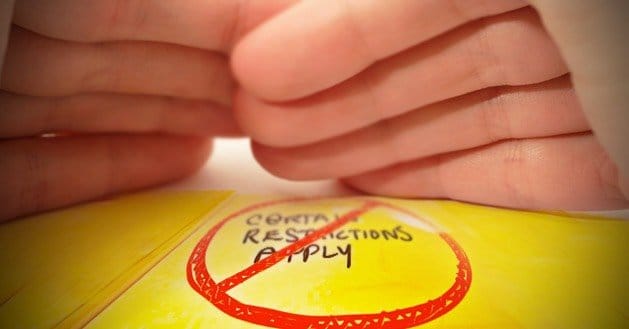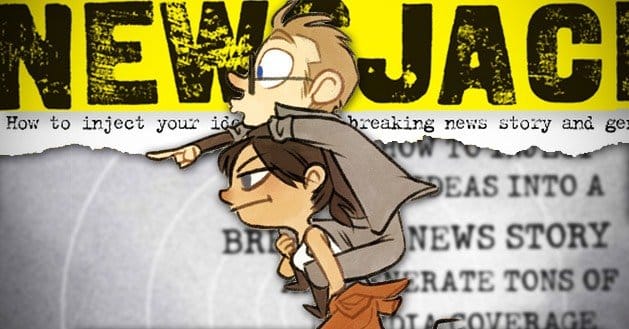 Written by ContentPowered.com
Written by ContentPowered.com
Facebook marketing is an incredibly powerful tool, but it has a range of potential pitfalls if you’re not careful. You can alienate users, incur search penalties, lose user data or even run afoul of the law. Any one of these can be disastrous for a business, so you need to protect yourself and your customers. Here are some threats, and some ways to protect yourself.
Legal Safety
Some laws, like copyright law, are warped and twisted when the Internet is involved. Some like those regarding data harvesting and web spam, are much more clear cut.
Threat #1: Copyright Violation
When you publish content, you either attribute it to its source or people assume it’s your own. Some items are not yours, but can be published under fair use. This includes images, videos, songs and the written word. Everything, technically, is copyrighted automatically once it has been created, no registration necessary. Fair Use allows the use of copyrighted material for certain uses, and public domain items can be used in any way freely. With all of this to consider, it seems like a legal minefield waiting to happen.
In reality, most minor copyright violations go unnoticed, unreported and unenforced. Unfortunately, that puts businesses into the mindset of safety in obscurity. The one time you’re caught, however, can have drastic consequences.
To protect yourself, limit yourself to content you create, content under creative commons and content under a commercial license you have purchased. Any post you share on Facebook should be legally yours to use.
Threat #2: Business Page Privacy
Your business page is a hub for discussion about your content, with the aim of attracting more users. It seems counterintuitive, then, to suggest locking down its visibility. For the most part, you won’t want to limit the visibility of any of your posts. The exception is when a publicly visible page is breaking the law. This occurs when your page is related to a controlled substance or regulated product, such as the lottery, alcohol, tobacco and firearms.
To protect yourself, use the age and content restrictions built into the Facebook page settings. You will want to set your primary country and the age necessary to use that product in that country. For alcohol, use the alcohol-specific settings, to apply to the various drinking ages around the world.
Threat #3: Data Harvesting
One of the primary reasons businesses like Facebook for marketing is the sheer amount of data they can harvest from their users. With so much easily available public data, it’s hard not to put it to use. Really, as long as you’re the only one using it – for optimization metrics, advertising targeting and other such reasons – you’re perfectly in the clear. The problem comes if you ever want to sell this data to a third party.
The laws that govern personal information such as what you harvest through Facebook are the same laws governing credit reporting agencies. For the purposes of prosecution, the definition of credit reporting agency is expanding every year, to the point that your business could gain that classification. That means, if you try to sell user data, you can fall afoul of those laws.
To protect yourself, simply don’t sell your user data. It makes your users feel more comfortable knowing you won’t sell their data, and it keeps you safe from the previously mentioned laws.
Privacy and Internet Security
While we’re on the subject of user data, privacy is a huge concern in the digital age. Even though your users post countless valuable facts about themselves on Facebook, they still cry out against privacy violations. Even harvesting publicly available data for particular uses, without notification, can raise a social movement against you.
Threat #4: App Privacy
One great use of Facebook is the app. Making use of an app has countless benefits, from engagement to exposure, data mining to product sales. Requiring the input of some piece of data to use an app is a frequent tactic to gain insight into your users, but then you’re faced with the issue of data security. How are you harvesting that data? Is your app secure against intrusion?
To protect yourself, design your app with security in mind. Avoid collecting data you can’t use. Be aware that it is your responsibility to make sure your app is secure and that it doesn’t open up a vulnerability on the platform. Use encryption for any data transmission.
Threat #5: Facebook Account Security
Once again, the primary focus of a Facebook page is to expose your business to as many people as possible. With exposure, however, comes threat. You need to keep your account secure, or else you jeopardize the privacy of all of your users. That’s not to mention any secure data stored in your account.
To protect yourself, make sure you’re using a strong password composed of 10 or more digits, letters and numbers, upper and lower case, with symbols. Avoid dictionary words, even with letter-number substitutions. Avoid making your security question answers easy to deduce – in fact, make them unrelated, if you can remember the unrelated answers – and take limit the number of people who have access to your account.
Social Safety
Stepping away from the technical side, you also have to concern yourself with the social aspects of social media.
Threat #6: Artificial Growth
When using Facebook for marketing, you need to gain exposure. To gain exposure, you need to induce people to follow your page. People tend to follow popular pages more often than unpopular pages, so it can be tempting to take steps to make your page look more attractive. Be aware, however, that artificially enhancing your page is like performance enhancing drugs in sports; they may work for a while, but when you’re caught, the consequences can be devastating.
To protect yourself, avoid buying social metrics or paying for artificial growth. These metrics typically come from follower accounts made and operated by bots, which is against the Facebook terms of service. Not only will those bots be found and removed, removing their social benefit to your page, but you may also be penalized for purchasing their services.
Threat #7: Controversy
Controversy spawns discussion and argument. Argument is traffic, and traffic is popularity. Popularity leads to a viral explosion of exposure. It seems easy; tempt the fates with a controversial topic and watch the traffic roll in. Unfortunately, it’s never that easy. Users recognize when a business is drumming up controversy just to get people talking. They also will likely ask your stance, and picking the wrong stance can turn the viral explosion against you.
To protect yourself, avoid controversy for its own sake. It’s fine to ask users which of the teams in the Superbowl they prefer. It’s fine to ask them which actors they like to see in a given show. It’s a minefield to ask them where they stand on the foreign wars, political parties or marriage debates. Be cautious about what you ask.
Threat #8: Newsjacking
Newsjacking is when your business picks a timely current event, something that is happening that day, and ties it into your advertising in some way. On a basic level, posting a deal on a holiday is newsjacking that holiday. One famous example is Oreo posting an ad commenting on the Superbowl blackout as it happened. As always, however, a technique that works may be misused.
To protect yourself, be careful with how you newsjack. Avoid tragedies and try to provide value to your readers, whether that value is a bit of humor or an actual service. Duracell newsjacked the superstorms by providing charging stations; that’s a good example. Don’t just comment on the weather by saying you sell dry clothing.


